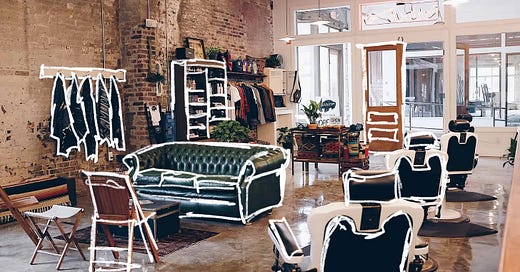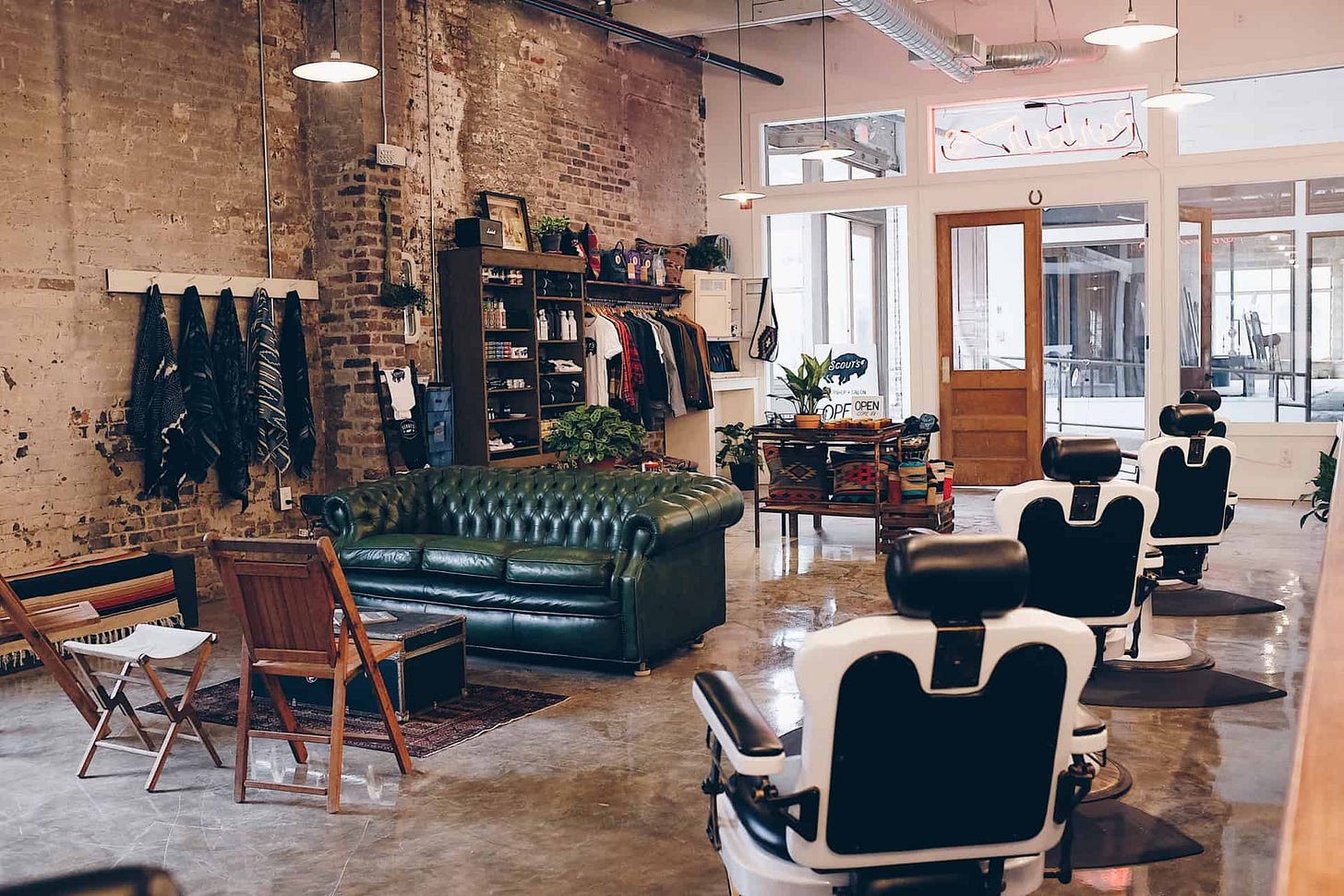Barbershops, Dumbo, and Surrender
How getting a hair cut sent me to middle school and back, and the gift that it was.
Straight from a therapists office to your inbox, More to the Story inspires self-reflection and growth through a combination of personal essays, clinical perspective, and practical tools designed to support you on your journey toward wholeness
Please feel welcome to share parts of this letter that resonate with you, or send to someone you think of. Thanks for reading, subscribing, commenting, sharing and for just being here
I was heading to the barbershop after a long day of seeing clients (I'm a counselor for any new folks here), and the emotional weight of the painful things people were working through this day was acutely noticeable in my body. Walking out into 96-degree thick, humid Nashville heat didn't help.
Before I tell you the story of how this particular haircut soon became a corrective emotional experience (CEE), I need to give you some back story.
In middle school, and high school too if I'm being honest, I was insecure about my ears. They seemed to stick out in a way that wasn't normal (normal is a myth by the way, read this book if you aren’t convinced) compared to most other kids' ears. My mom would say that the rest of my body was still growing and that my ears were just growing faster and the proportion wasn't really that disparate.
That well-intended encouragement didn't eliminate the embarrassment I felt, and it didn't stop the kids who were overtly making fun of my ears.
Dumbo. That’s what they called me. Which, as I think of it now, doesn't really work as an insult since that story is about a baby elephant with big ears who is teased by others but eventually becomes famous for them. Not that I became famous for my ears, or want to, but you get the idea. It’s a story about self-belief, friendship, and tolerance and celebration of differences. More of a compliment than an insult.
I unfortunately didn't have that perspective back then. Instead I just kept my hair long so it covered my ears. It served as a distraction and protection from something that I had many feelings about, at the time of which I wasn't aware and likely wouldn't have known what to do with if I were aware. How fascinating is it that part of me would come up with such a clever strategy as to use the most common hairstyle for boys at the time as a smoke screen hiding a deep insecurity?
This also means that whenever I got my haircut, the odds I would get very very upset were high. I wish I were being sarcastic, but one time I punched the roof of our van while in the passenger seat after getting a haircut that ended up being shorter than I wanted, shattering the mirror in the sun visor in the process.
I couldn't control kids bullying me. I couldn't control the size or pace at which my ears decided to grow. So when my hair, the one thing I thought I had control over, was cut too short, it was not okay.
When we don’t have control, we're met with the need to surrender and accept. If we don't know how to give ourselves over to surrender and acceptance as the gifts they can be, we resort to rage because it gives us the illusion of control. Rage leaves us disconnected and lonely, the exact opposite of what we’re desiring most.
I wish I knew that back then. Fast forward all these years later, and the insecurity of my ears sticking out is a rare occurrence. Maybe I'm finally experiencing what Helen Aberson-Mayer had intended all along when she wrote Dumbo with her husband in 1938.
That old insecurity still finds its way into my consciousness when I enter a barbershop though. These days I intentionally don't go to the same sylist at the same shop, which many guys do. So when guys hear me say I take whoever is available at whatever time I need at whatever barbershop I’m nearest, they think I'm crazy. But I'm realizing it's important for me to do that.
Why? Because it's healing an old narrative in a peculiar way. It reminds me that if my hair cut isn’t perfect, I'm still okay. My ears can be exposed, and I don't have to hide or be insecure about them. I also don't need to rage to feel the illusion of control, but I can experience the gifts of surrender and acceptance.
There's another internal experience I have in the barbershop. Part of me feels compelled to engage the person cutting my hair. I worry that if I don't ask about their day or their work or their life, they may think I'm rude or unfriendly. It's a similar feeling to getting a massage, though easier to avoid when you're face down with your eyes closed.
This day I was tired and was hoping I didn't get a chatty barber, and to my surprise, I got what I hoped for. I sat down, she asked me what I wanted to do with my hair, we talked through it for a moment, I leaned back, closed my eyes and she didn't say anything for the rest of the haircut. It was wonderful.
I sat there with my eyes closed, mostly for the whole session, having this internal dialogue and experience that I'm attempting to tell in this letter. Many times I noticed the part of me that wanted to start asking questions.
Something to note - I don't believe keeping dialogue alive in moments like this is simply about wanting to be kind. It's rare for us to sit still without digital distractions the way we do when getting our hair done. So, maybe the need to keep conversation going is also an attempt to avoid being with whatever rises to the surface when we slow down, like, oh I don't know, memories of being bullied and haircut tragedies.
When I noticed myself wondering what the stylist was thinking about me and then wanting to ask her questions, I gently reminded myself of a few things that helped to relax and be present:
It's not selfish to let this moment be about me.
To not always be on isn't rude, it's human.
Being present with these uncomfortable memories and feelings is healthy and necessary.
If this person was to convince themselves I'm a rude person based on this one interaction, I’m still okay. And maybe, that would say more about them than me.
As I reflect on this experience, maybe my story and your story isn't so different from Dumbo's. What once made us feel isolated now connects us to our humanity. What once left us feeling powerless now helps us open the gifts of surrender and acceptance.
As the name of this newsletter suggests, there's always more to the story. Our awareness of the "more" determines how connected of an experience we have with ourselves, and therefore, with others.







"we resort to rage because it gives us the illusion of control." How true is this. I often say I was born with an abundance of rage, inherited from generations of women in my family. My mother and my grandmothers' generation of Asian women had no control nor say in their own lives, but they had rage. Now I understand why, because "rage" was the only control they had.
I also think anger is the easiest and most widely accepted emotion (at least in my culture when I was growing up). Affection was too embarrassing, proud was too prideful, sad was "you think too much" or "you're too sentimental"; but rage? It was everywhere and was often justified for the parents to show.
So good for that inner boy! Love the share. Your space! your body! your call! glad it was cathartic and healing.